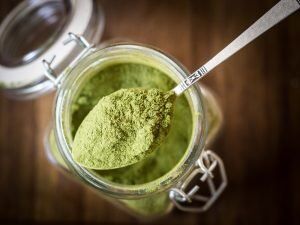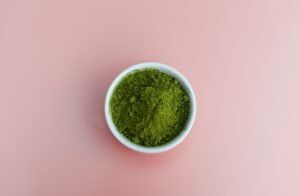
Top 4 Benefits of Green Tea
With its origins stretching back as far as 5,000 years ago it’s fair to say green tea has a history and whilst it used to be something you’d only find in the Fat East where is drunk and grown widely its popularity has exploded in the West in recent years.
Derived from the leaves of a plant called Camella Sinensis it is available in a range of varieties that vary in price, taste and quality.
Known for its emerald green colour it is widely revered for its many health benefits.
A big reason for its growth in popularity is because of the high number of antioxidants called catechins that it contains.
When it comes to supplementation green tea can be bought as green tea extract, which is simply the concentrated form of the tea but the added benefit of obtaining all the benefits one cup in just one capsule.
Like the tea, green tea extract is a source of antioxidants and other sought-after health benefits. In this article, we’ll explore X of them.
 1 – Can Assist Fat Loss
1 – Can Assist Fat Loss
Green tea or green tea extract does this in several ways:
- Boosting fat-burning hormones like norepinephrine in the body [1]
- Increasing the fat-burning effects of exercise
This is primarily the effect of antioxidants called catechin and in particular, one called epigallocatechin (EGCG) which can boost your metabolism.
It does by increasing the hormone norepinephrine which breaks down fat so it can be moved into your bloodstream and used for energy. [2]
Another study showed that those who supplemented with green tea extract burnt up to 17% more fat during exercise than those who didn’t [3] with some evidence showing that green tea extract may also increase the amount of fat lost from the stomach. [4, 5]
2 – Can Increase Your Metabolism
Green tea extract may also boost your metabolism by 3 – 8% with the effect varying between individuals. [6, 7, 8]
Although this effect is quite small, 3% of a 1,800-calorie intake is 54 calories, when you’re also eating in a calorie deficit, getting sufficient protein and training regularly this effect becomes more significant.
3 – May Improve Recovery from Exercise
Whilst it’s a recommended part of a healthy lifestyle, exercise produces oxidative stress and damages the body.
Antioxidants found in green tea have been shown to reduce cellular damage and muscle fatigue. [9, 10, 11]
 4 – May Reduce Disease Risk
4 – May Reduce Disease Risk
Whilst existing research [12, 13, 14] has only been conducted in test tube and animals, the results are promising that the catechins in green tea could offer protection from neurodegenerative diseases likes Alzheimer’s and Parkinson’s disease.
It is thought they do this by protecting brain cells from oxidative stress and improving memory. [15] However, more research is needed to fully understand the effect it has.
Additionally, there is some evidence [16] that regular consumption of green tea or green tea extract may help prevent type 2 diabetes.
- One study found those who drank the most green tea had about a 42% lower risk of developing type 2 diabetes [17]
- Another review paper looking at the results from 7 studies found that those who drank green tea has an 18% lower risk of developing type 2 diabetes [18]
Additional Benefits
There is also evidence that green tea consumption may prevent cardiovascular disease [19], help you live longer [20], reduce the risk of some cancers including prostate cancer [21] and improve skin health [22].
Summing Up
Green tea is a well-researched, widely available and safe compound to consume either as a tea or in supplement form as green tea extract.
Not only does it offer several health preserving benefits but it also offers an advantage to those looking to optimise their fat loss efforts.
Shop our range of green tea capsules (perfect for when you’re on the go) or green tea powder (perfect for mixing into smoothies).
References
- [1] Physiology & Behavior. Volume 100, Issue 1, 26 April 2010; Green tea catechins, caffeine and body-weight regulation. M.S.Westerterp-Plantenga
- [2] Drug Metab Dispos. 2003 May; Enzymology of Methylation of Tea Catechins and Inhibition of catechol-O-methyltransferase by (-)-Epigallocatechin Gallate. Hong Lu, Xiaofeng Meng, Chung S Yang
- [3] Am J Clin Nutr. 2008 Mar; Green Tea Extract Ingestion, Fat Oxidation, and Glucose Tolerance in Healthy Humans. Michelle C Venables, Carl J Hulston, Hannah R Cox, Asker E Jeukendrup
- [4] Int J Obes (Lond). 2009 Sep; The Effects of Green Tea on Weight Loss and Weight Maintenance: A Meta-Analysis. R Hursel, W Viechtbauer, M S Westerterp-Plantenga
- [5] The Journal of Nutrition, Volume 139, Issue 2, February 2009; Green Tea Catechin Consumption Enhances Exercise-Induced Abdominal Fat Loss in Overweight and Obese Adults, Kevin C. Maki, Matthew S. Reeves, Mildred Farmer, Koichi Yasunaga, Noboru Matsuo, Yoshihisa Katsuragi, Masanori Komikado, Ichiro Tokimitsu, Donna Wilder, Franz Jones, Jeffrey B. Blumberg, Yolanda Cartwright.
- [6] Dulloo AG, Duret C, Rohrer D, et al. Efficacy of a green tea extract rich in catechin polyphenols and caffeine in increasing 24-h energy expenditure and fat oxidation in humans. Am J Clin Nutr. 1999;70(6):1040-1045. doi:10.1093/ajcn/70.6.1040
- [7] Bérubé-Parent S, Pelletier C, Doré J, Tremblay A. Effects of encapsulated green tea and Guarana extracts containing a mixture of epigallocatechin-3-gallate and caffeine on 24 h energy expenditure and fat oxidation in men. Br J Nutr. 2005;94(3):432-436. doi:10.1079/bjn20051502
- [8] Belza A, Toubro S, Astrup A. The effect of caffeine, green tea and tyrosine on thermogenesis and energy intake. Eur J Clin Nutr. 2009;63(1):57-64. doi:10.1038/sj.ejcn.1602901
- [9] Powers SK, Ji LL, Leeuwenburgh C. Exercise training-induced alterations in skeletal muscle antioxidant capacity: a brief review. Med Sci Sports Exerc. 1999;31(7):987-997. doi:10.1097/00005768-199907000-00011
- [10] Bloomer RJ, Goldfarb AH. Anaerobic exercise and oxidative stress: a review. Can J Appl Physiol. 2004;29(3):245-263. doi:10.1139/h04-017
- [11] Ji LL. Antioxidants and oxidative stress in exercise. Proc Soc Exp Biol Med. 1999;222(3):283-292. doi:10.1046/j.1525-1373.1999.d01-145.x
- [12] Weinreb O, Mandel S, Amit T, Youdim MB. Neurological mechanisms of green tea polyphenols in Alzheimer’s and Parkinson’s diseases. J Nutr Biochem. 2004;15(9):506-516. doi:10.1016/j.jnutbio.2004.05.002
- [13] Mandel SA, Amit T, Weinreb O, Reznichenko L, Youdim MB. Simultaneous manipulation of multiple brain targets by green tea catechins: a potential neuroprotective strategy for Alzheimer and Parkinson diseases. CNS Neurosci Ther. 2008 Winter;14(4):352-65. doi: 10.1111/j.1755-5949.2008.00060.x. PMID: 19040558; PMCID: PMC6493995.
- [14] Caruana M, Vassallo N. Tea Polyphenols in Parkinson’s Disease. Adv Exp Med Biol. 2015;863:117-137. doi:10.1007/978-3-319-18365-7_6
- [15] Mandel S, Weinreb O, Amit T, Youdim MB. Cell signaling pathways in the neuroprotective actions of the green tea polyphenol (-)-epigallocatechin-3-gallate: implications for neurodegenerative diseases [published correction appears in J Neurochem. 2004 Apr;89(2):527]. J Neurochem. 2004;88(6):1555-1569. doi:10.1046/j.1471-4159.2003.02291.x
- [16] Kai Liu, Rui Zhou, Bin Wang, Ka Chen, Lin-Ying Shi, Jun-Dong Zhu, Man-Tian Mi, Effect of green tea on glucose control and insulin sensitivity: a meta-analysis of 17 randomized controlled trials, The American Journal of Clinical Nutrition, Volume 98, Issue 2, August 2013, Pages 340–348.
- [17] Iso H, Date C, Wakai K, Fukui M, Tamakoshi A; JACC Study Group. The relationship between green tea and total caffeine intake and risk for self-reported type 2 diabetes among Japanese adults. Ann Intern Med. 2006;144(8):554-562. doi:10.7326/0003-4819-144-8-200604180-00005
- [18] Huxley R, Lee CMY, Barzi F, et al. Coffee, Decaffeinated Coffee, and Tea Consumption in Relation to Incident Type 2 Diabetes Mellitus: A Systematic Review With Meta-analysis. Arch Intern Med. 2009;169(22):2053–2063. doi:10.1001/archinternmed.2009.439
- [19] Shinichi Kuriyama, The Relation between Green Tea Consumption and Cardiovascular Disease as Evidenced by Epidemiological Studies, The Journal of Nutrition, Volume 138, Issue 8, August 2008, Pages 1548S–1553S
- [20] Kuriyama S, Shimazu T, Ohmori K, et al. Green tea consumption and mortality due to cardiovascular disease, cancer, and all causes in Japan: the Ohsaki study. JAMA. 2006;296(10):1255-1265. doi:10.1001/jama.296.10.1255
- [21] Norie Kurahashi, Shizuka Sasazuki, Motoki Iwasaki, Manami Inoue, Shoichiro Tsugane for the JPHC Study Group, Green Tea Consumption and Prostate Cancer Risk in Japanese Men: A Prospective Study, American Journal of Epidemiology, Volume 167, Issue 1, 1 January 2008, Pages 71–77.
- [22] Pazyar N, Feily A, Kazerouni A. Green tea in dermatology. Skinmed. 2012;10(6):352-355.


 1 – Can Assist Fat Loss
1 – Can Assist Fat Loss 4 – May Reduce Disease Risk
4 – May Reduce Disease Risk
No Comments yet!